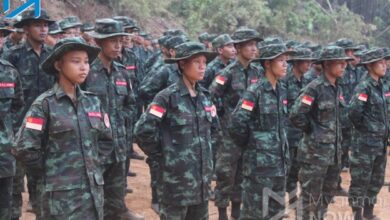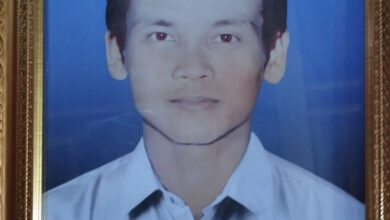
Around 2,000 workers from a garment factory in Yangon’s Zaykabar Industrial Park in Mingaladon Township went on strike on Thursday morning, declaring that violations of their basic rights had grown unbearable.
The workers are employees of JW factory, which is owned by Great Glowing Investment and operated by another factory in the industrial park: ADK, or “A Dream of Kind.” They are both managed by the same Canadian nationals, according to Myanmar’s Directorate of Investment and Company Administration.
The factories reportedly manufacture clothing for international sportswear brands including Crivit and employ nearly 7,000 people.
Around 20 junta soldiers and police also arrived in the industrial park at around 11am to speak with the factory management, according to the striking workers. The outcome of the discussion was not known at the time of reporting.
“Representatives from the workers’ affairs department [within the military council] came to negotiate, but that department is filled with people on [the employer’s] side,” a 22-year-old woman participating in the walkout said.
The woman, who is also enrolled in her final year in Dagon University’s distance learning program, started working at the site in 2020, during the height of the Covid-19 pandemic. She was hired at a pay rate of 4,800 kyat (US$2.50) per day, and 1,200 kyat ($0.65) per hour for overtime shifts—Myanmar’s minimum wage.
She told Myanmar Now she was required to work 12-hour shifts six days per week, and that her employer had been pushing workers to complete more than 60 garments hourly—a quota that they could not meet.
“We can barely make 45 pieces an hour but now they’re asking us to finish 62 pieces an hour,” she told Myanmar Now. “Injustice is widespread here. The workers are not able to practise any of the rights we are entitled to.”
In order to meet the performance expectations set by factory management, she added that it had become difficult to take a 30-minute break for lunch, or to use the toilet during their shifts.
Another 21-year-old woman from Bago participating in the strike said that she had only been paid a monthly salary of 270,000 kyat ($145) and had been required to work more than 100 overtime hours.
“They keep cutting our salaries [for not meeting their requirements]. In this system, there are more punishments for us than rewards,” she said.
Many of Yangon’s factories are located in townships where the military has declared martial law, including Hlaing Tharyar, North and South Dagon, Dagon Seikkan, North Okkalapa and Shwepyitha.
Widespread factory closures following the February 2021 coup contributed to the loss of jobs of some 1.6m workers nationwide, according to the International Labour Organisation.
Workers from Yangon’s factories were among the first members of the public to protest the coup. Some 16 labour organisations were subsequently outlawed by the junta, and members and leaders of unions charged with incitement.
Ye Naing Win, the secretary general of one of the banned groups—the Coordination Committee of Trade Unions—recently described to Myanmar Now how labour rights had further deteriorated since the coup, with factory workers being inadequately compensated and unfairly fired, and complaint mechanisms under the junta typically favouring employers.
![Resistance fighters holding heavy weapons ammunition in central Myanmar. (Photo: Freedom Revolution Force [FRF])](https://myanmar-now.org/en/wp-content/uploads/sites/5/2024/04/438869056_443267851680128_1706386881626943924_n-390x220.jpeg)


